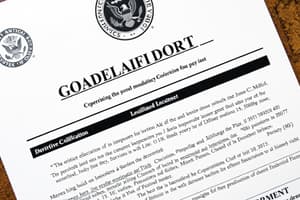Podcast
Questions and Answers
What does OCA stand for?
What does OCA stand for?
- Official Classification Association
- Operational Classification Agency
- Original Classification Authority (correct)
- Original Clearance Authority
Who are responsible for ensuring the highest standards in derivative classification?
Who are responsible for ensuring the highest standards in derivative classification?
Derivative classifiers
What are the two primary sources of policy guidance for derivative classification?
What are the two primary sources of policy guidance for derivative classification?
Volumes 1 through 4 of the DoD Information Security Program
What is one of the authorized sources for derivative classification?
What is one of the authorized sources for derivative classification?
What happens during the process of extracting?
What happens during the process of extracting?
What must derivative classifiers ensure when paraphrasing or restating information?
What must derivative classifiers ensure when paraphrasing or restating information?
What does generating refer to in derivative classification?
What does generating refer to in derivative classification?
What does the term 'contained in' refer to?
What does the term 'contained in' refer to?
What does the term 'revealed by' imply?
What does the term 'revealed by' imply?
What can combining unclassified information result in?
What can combining unclassified information result in?
What are the three criteria information must meet to be classified?
What are the three criteria information must meet to be classified?
What are administrative sanctions?
What are administrative sanctions?
What might UCMJ sanctions include?
What might UCMJ sanctions include?
What are examples of criminal sanctions?
What are examples of criminal sanctions?
Flashcards are hidden until you start studying
Study Notes
Original Classification Authority (OCA)
- Represents all cleared DoD and authorized contractor personnel responsible for generating or creating documents from classified sources.
Derivative Classifiers
- Must apply high standards when classifying information and receive training every two years.
- Cannot make original classification decisions; only OCA has that authority.
Policy Guidance Sources
- Volumes 1 through 4 of the DoD Information Security Program provide regulatory requirements and guidance for derivative classification practices.
Authorized Sources for Derivative Classification
- Security Classification Guide (SCG): Contains detailed classification guidance for specific programs or operations.
- Properly Marked Source Documents: Information can be extracted, paraphrased, or restated while retaining the original classification.
- DD Form 254: Provides security classification specifications for contractors; the Government Contracting Activity supplies proper guidance.
Security Classification Guide (SCG)
- Comprises comprehensive guidance about classified elements.
- Specifies classification levels, reasons for classification, and downgrading/declassification timelines.
Extracting Information
- Involves directly taking information verbatim from an authorized source into a new document.
Paraphrasing or Restating
- Rewords information from an authorized source in a new document; must maintain the original classification.
Generating Information
- Involves transforming information from an authorized source into a different medium, such as videos or CDs.
Concepts of Classification
- Contained In: Information incorporated from an authorized source into a new document without needing additional interpretation.
- Revealed By: Information included but not explicitly stated in the initial document, requiring some interpretation to deduce.
Compilation or Aggregation
- The combination of multiple unclassified pieces of information can create a classified aggregate.
Criteria for Classification
- Information must be government-owned, with unauthorized disclosure causing substantial security damage, and relate to specific national security categories as per Executive Order 13526.
Administrative Sanctions
- Consequences for classification violations: suspension without pay, security clearance revocation, employment termination, and loss of DoD contracts.
UCMJ Sanctions
- Military personnel may face loss of rank, pay reductions, dishonorable discharge, and incarceration for classification violations.
Criminal Sanctions
- Violations may lead to incarceration, monetary fines, and loss of federal retirement benefits.
Studying That Suits You
Use AI to generate personalized quizzes and flashcards to suit your learning preferences.




